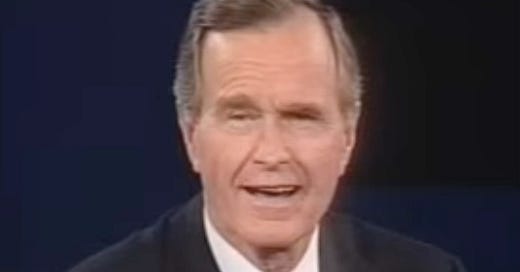Imagine a moderate president with a solid record of first term accomplishments seeking reelection. The economy has gone through some rough patches, but finally as the election year unfolds, growth has returned and people are finding work, conditions favorable to an incumbent. Except… no one believes it. And no matter what the president’s team does, they can’t seem to convince the media or the public that times are actually good.
I’m talking of course about 1992, when President George H.W. Bush was presiding over a recovering economy. His one term in office was something of a popularity rollercoaster. He’d enjoyed approval ratings as high as 89 percent in the wake of the brief Gulf War in early 1991. But the recession that took hold that year caused a sharp spike in unemployment and took a toll on his approval ratings, which dropped from the 70s into the 20s between the summers of 1991 and 1992.
I was reminded of this from a presentation by political scientist Daron Shaw (who worked on that Bush campaign) at the recent meeting of the Midwest Political Science Association. As Shaw noted, this was endlessly frustrating to the Bush campaign, which quite reasonably assumed that a recovering economy would mean improving reelection prospects. But at least in part because unemployment came down only slowly that election year, many Americans still didn’t believe the economy was improving. The Clinton campaign deftly exploited economic worries to unseat the incumbent.
As political scientist Marc Hetherington has written, this was a somewhat novel political environment in 1992 in that the media’s coverage of the economy was relentlessly negative and at odds with economic reality. While voters are often more inclined to reward or punish politicians based on their own experiences with the economy, that year they seemed to respond to the media image of the poor economy.
Yes, arguably, we are seeing a very similar replay today. By just about all objective measures, the economy is humming along quite well, creating solid job growth and GDP growth, with unemployment under 4 percent, and with the high inflation of 2021-22 an increasingly distant memory. And interestingly, many voters seem to regard their own economic situation, and even that of their state or community, as improving, but they still see the national economy as in a poor state.
One of the things that Shaw noted was that public opinion about the economy has remained relatively stagnant since the beginning of 2020. This is quite striking, considering how radically the economy has changed since that time, including a terrifying dive in mid-2020 followed by substantial income growth later that year thanks to federal government income supports. Arguably, there are so many ways to look at the economy, and such a polarized media environment, that people can find any kind of economic news coverage they want to see. But it’s still notable how divorced this is from actual economic data.
To the extent the Biden team is looking at Bush’s experience from three decades ago, another striking thing is how impotent Bush was in trying to reshape people’s views. Democrats today often urge Biden to lean more into messaging to positively depict economic good times, but there are real limits on what a president can do to convince people of economic information they don’t want to hear. It’s not for lack of effort; Biden has a strong governing and campaign team, as Bush did in 1992, but convincing people to think about something differently is just not a well established presidential power.
This doesn’t, of course, mean that Biden is doomed to the same electoral fate that Bush met. For one thing, Biden’s opponent is far less popular than Bush’s was. For another, today’s economy was arguably at one of its weakest moments in mid-2022, with inflation exceeding 9 percent, and Biden and his fellow Democrats still enjoyed a relatively successful midterm election that year.
I’ll link to what I wrote here, which is the somewhat disturbing conclusion that presidential approval ratings may have ossified and become detached from economic perceptions. That is, regardless of whether people come to believe that the economy is improving, the election is still likely to be very close, and a slugfest among a few tens of thousands of voters in a handful of states. This may not be much of a comfort to either campaign, but it does suggest a very competitive environment regardless of what the economy does.







If Biden pukes in the Japanese PM's lap we'll know he really is done for: https://en.wikipedia.org/wiki/George_H._W._Bush_vomiting_incident (He might actually get points for puking on Bibi though...)
Does the fact that there was no recession or spike and unemployment this time even matter?